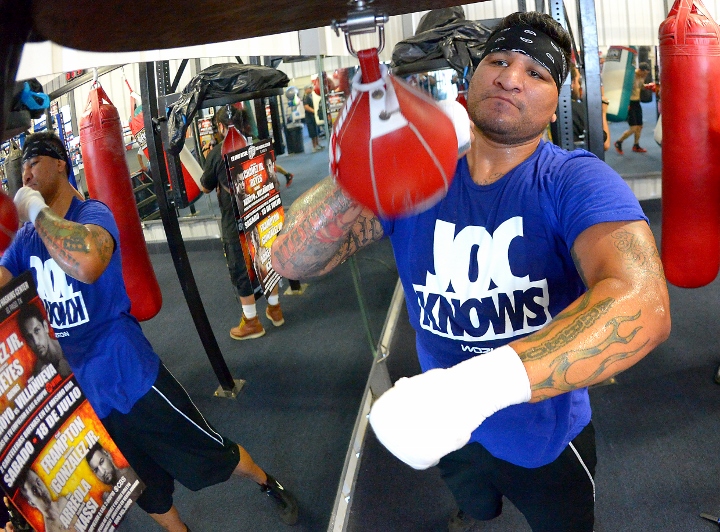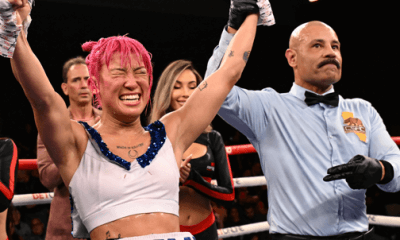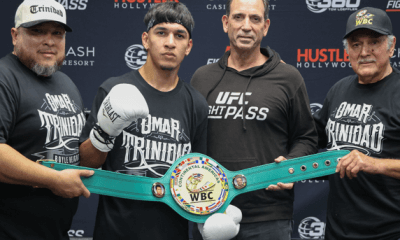Featured Articles
A Bevy of Tarnished Heavyweights Vie to Become the Next Bermane Stiverne

In the murky shadows of heavyweight boxing, several fighters with recognizable names are jockeying to become the next Bermane Stiverne, by which we mean the next pawn in the career of a well-connected up-and-comer, someone such as Filip Hrgovic who recently linked up with powerful promoter Eddie Hearn. Hrgovic and other talented fighters at his stage of development are in search of opponents, more specifically sacrificial lambs, the most alluring of whom are those with recognizable names. And the chosen few get a nice paycheck to assuage their hurt and keep their creditors at bay.
Leading candidates to be the next pawn include former titlist Charles Martin and two-time world title challenger Chris Arreola (pictured), who will both be in action on the Spence-Garcia pay-per-view card. Martin (25-2-1) opposes Gregory Corbin (15-0) and Arreola (37-5-1) meets Jean Pierre Augustin (17-0-1). And then there’s Samuel Peter who appeared on a show this past weekend in Tijuana, thereby sending a message that if the money is right he would welcome an opportunity to go overseas and serve as a building block for someone like Hrgovic, a role for which Sam Peter is well-practiced.
Arreola
Chris Arreola, who turns 38 in a few days, is a three-time world title challenger, succumbing inside the distance to Vitali Klitschko, Bermane Stiverne, and Deontay Wilder. His best win was a first round stoppage of Eric Molina, but that was long ago. In his most recent bout against a noted opponent, he out-pointed Travis Kaufman by split decision, a verdict that was changed to “ND” when his post-fight urine exam showed traces of marijuana.
This was the second time that Arreola was exposed as a consumer of the “evil weed.” Back in 2011, his victory over Friday Ahunanya, a wide 10-round decision, was also voided. Take away those two no-decisions and Arreola’s ledger improves to 39-5-1.
Arreola’s opponent on March 16, Jean Pierre Augustin, is a 31-year-old Haitian currently residing in Louisville. A part-time actor with a few movie credits to his name, Augustin’s last fight was in the Mexican/Arizona border town of Agua Prieta where he defeated a no-name fighter who reportedly carried 334 ½ pounds on a six-foot-two frame.
Arreola says that he will retire if he loses this fight. In an interview with a writer from East Side Boxing, Chris acknowledged that he felt soreness in the mornings after a session in the gym, soreness that he did not feel in his younger days. We have no clue what Augustin will bring to the table, but Arreola will be favored and if he wins, as expected, a substantially richer payday likely awaits him around the next corner.
Arreola has a lot of mileage on his odometer, however, and is a strong candidate for pugilistic dementia if he keeps fighting.
Martin
Charles Martin won the vacant IBF title in January of 2016 with a third round stoppage of Vyacheslav Glazkov and gave it up in his first defense when he was demolished by Anthony Joshua who stopped him in the second round. His tenure as a heavyweight title-holder lasted 85 days, the shortest on record.
Martin’s win over Glazkov was tainted. Glazkov slipped as his feet got tangled with Martin’s and he suffered a torn ACL in his right knee as he fell to the canvas. To that point, the fight was shaping up as a dreary affair.
In his last start, Martin and undefeated Adam Kownacki engaged in an entertaining slugfest. Martin came out on the short end of a close decision, but regained some of his lost stature.
Gregory Corbin, his next opponent, is 38 years old. We have never seen Corbin fight but we suspect he will be competitive. Before he went off to prison for seven-and-a-half years on a cocaine trafficking conviction, Corbin was a national Golden Gloves champion.
Partly because his tenure as a title-holder was so short, Charles Martin is widely considered the worst heavyweight champion of the four-belt era. Bermane Stiverne also warrants consideration for that dubious honor and perhaps also Oliver McCall.
We mention McCall, now 53 years old, only because, sad but true, he’s still active. The erstwhile Atomic Bull has a fight scheduled on the last Saturday of March against a tub of lard named Ronald Baca in Robstown, Texas.
Samuel Peter
Peter brought a record of 36-6 (29 KOs) into his match this past Friday with Gerardo Escobar at Cheer’s Bar in Tijuana. We don’t know the result of that fight — it’s not up on BoxRec and a google search came up empty — but we’ll take it on faith that Peter prevailed and likely without working up much of a sweat. In documented fights, Escobar was 2-21 and had been stopped 15 times.
Peter had previously used Tijuana as a steppingstone. In October of 2016, he defeated a boxer from Mexicali named Juan Carlos Salas in this hardscrabble city. Salas, who was mired in a 7-fight losing streak, quit after three rounds. That triumph propelled Samuel Peter into a match with Kubrat Pulev in Bulgaria where it was he who quit on his stool after three rounds. He was undoubtedly well compensated.
There was a day when Peter was being touted as the next big thing in the heavyweight division. His vicious one-punch knockout of Jeremy Williams stamped him as the division’s hardest hitter since Mike Tyson. There was a lot of smart money on the Nigerian Nightmare when he opposed Wladimir Klitschko in 2005 in Atlantic City in Peter’s first stab at a heavyweight title. He knocked Klitschko down three times but lost most of the rounds and lost by three points on all three scorecards.
Six fights later, Peter won the WBC title with a sixth round stoppage of Oleg Maskaev, but he lost the belt in his first defense, falling to Vitali Klitschko. This was Vitali’s first start after sitting out almost four years while rehabbing an assortment of injuries, but Peter was the one that looked rusty. He retired on his stool after eight lopsided rounds.
Peter went on to secure a rematch with Wladimir Klitschko. In 2010, Wladimir stopped him in the 10th round at Frankfurt. Peter then became an opponent for rising contenders like Finland’s 14-0 Robert Helenius, who stopped him in nine frames, and the aforementioned Pulev. He came in at 271 pounds for Pulev, 20 pounds less than in a 2014 bout with a no-name opponent in Oklahoma City, but 28 pounds more than he carried in his first meeting with Wladimir Klitschko when he was at his peak.
Samuel Peter has seemingly been around forever, but he’s “only” 38 years old, younger than Luis Ortiz or Alexander Povetkin, or several others in his pod, soiled fighters with marketable names chasing one last stab at fistic glory or at least one more big paycheck to cushion their transition into the next phase of their lives.
We’re quite certain we haven’t seen the last of Samuel Peter. He just may be the next Bermane Stiverne.
Check out more boxing news on video at The Boxing Channel
To comment on this story in The Fight forum CLICK HERE
-

 Featured Articles3 weeks ago
Featured Articles3 weeks agoThe Hauser Report: Zayas-Garcia, Pacquiao, Usyk, and the NYSAC
-

 Featured Articles2 weeks ago
Featured Articles2 weeks agoOscar Duarte and Regis Prograis Prevail on an Action-Packed Fight Card in Chicago
-

 Featured Articles1 week ago
Featured Articles1 week agoThe Hauser Report: Cinematic and Literary Notes
-

 Book Review5 days ago
Book Review5 days agoMark Kriegel’s New Book About Mike Tyson is a Must-Read
-

 Featured Articles4 weeks ago
Featured Articles4 weeks agoManny Pacquiao and Mario Barrios Fight to a Draw; Fundora stops Tim Tszyu
-

 Featured Articles4 weeks ago
Featured Articles4 weeks agoArne’s Almanac: Pacquiao-Barrios Redux
-

 Featured Articles3 weeks ago
Featured Articles3 weeks agoRemembering Dwight Muhammad Qawi (1953-2025) and his Triumphant Return to Prison
-

 Featured Articles4 weeks ago
Featured Articles4 weeks agoOleksandr Usyk Continues to Amaze; KOs Daniel Dubois in 5 One-Sided Rounds


















